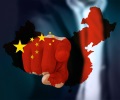[ad_1]

China and Singapore’s economic and trade ties will be reinforced by high-level free trade deals in the coming years, effectively mitigating the impact of geoeconomic fragmentation and creating new investment opportunities in each other’s markets, said trade experts and business leaders on Monday.
They made the remarks after the two countries announced on Saturday that they had completed substantive negotiations on the upgrade of their bilateral free trade agreement. The objective of the upgrade is to improve market access for their companies, while also establishing more transparent and advanced economic practices.
With agreements signed by China’s Minister of Commerce Wang Wentao and Singapore’s Minister for Trade and Industry Gan Kim Yong, the two sides confirmed that there will be no rollback of opening-up measures in the services and investment sectors, and promised each other that their respective doors will only open wider, said the Ministry of Commerce.
The upgraded deal, once sealed, will show the world that business ties between China and Singapore are on course to upgrading to new heights amid both countries’ steadfast multilateral push for the regional integration of the Association of Southeast Asian Nations, said Gao Lingyun, a researcher at the Institute of World Economics and Politics, which is part of the Chinese Academy of Social Sciences in Beijing.
In addition to advancing preparations for the further enhancement of the ASEAN-China Free Trade Area — or the ACFTA 3.0 — this move will further upgrade the Regional Comprehensive Economic Partnership pact, said Guo Da, assistant president at the Haikou, Hainan province-based China Institute for Reform and Development.
It will also create favorable conditions for China to join the Comprehensive and Progressive Agreement for Trans-Pacific Partnership and the Digital Economy Partnership Agreement, of which Singapore is a member of both, Guo said.
China’s commerce ministry said that the two countries will continue follow-up work related to legal review and translation of texts, and fulfil their respective domestic procedures to sign the agreement as soon as possible.
China and Singapore signed the FTA in 2008 and upgraded it in 2018.They upgraded the agreement again and launched subsequent negotiations to further liberalize services and investment based on a negativelist model in December 2020.
Driven by mega free trade deals such as the RCEP agreement, the growth of the Belt and Road Initiative and the New International Land-Sea Trade Corridor, China and Singapore saw their two-way trade value jump 22.8 percent year-on-year to $115.13 billion in 2022, said China’s General Administration of Customs.
From January to October 2022, Singapore’s investment in China reached $9.61 billion, up 15.7 percent year-on-year, while China’s investment in the Southeast Asian country amounted to $6.35 billion, surging 27.8 percent on a yearly basis, according to China’s Ministry of Foreign Affairs.
Boosted by growing trade and investment volume, China and Singapore will likely scale up trade and investment in fields like digital economy, “new infrastructure”, new energy and shipping in the next stage, said Zhang Jianping, head of the center for regional economic cooperation at the Chinese Academy of International Trade and Economic Cooperation.
China Energy Engineering Group Co Ltd, or Energy China, a Beijing-based State-owned enterprise, plans to invest more resources to expand its market share in green energy and new types of infrastructure in Singapore as well as other ASEAN member economies this year.
The Chinese company launched an energy storage project on Jurong Island in Singapore in December 2022. The project has a designed capacity of 200 megawatt-hours, the largest of its kind in Southeast Asia.
The project will help promote the transformation of Jurong Island into a sustainable chemical energy park in Singapore, and will help the city state achieve its carbon reduction targets as outlined in the Singapore Green Plan 2030, said Chen Xiaohua, Energy China’s vice-president.
Source: China Daily
[ad_2]
Source link
